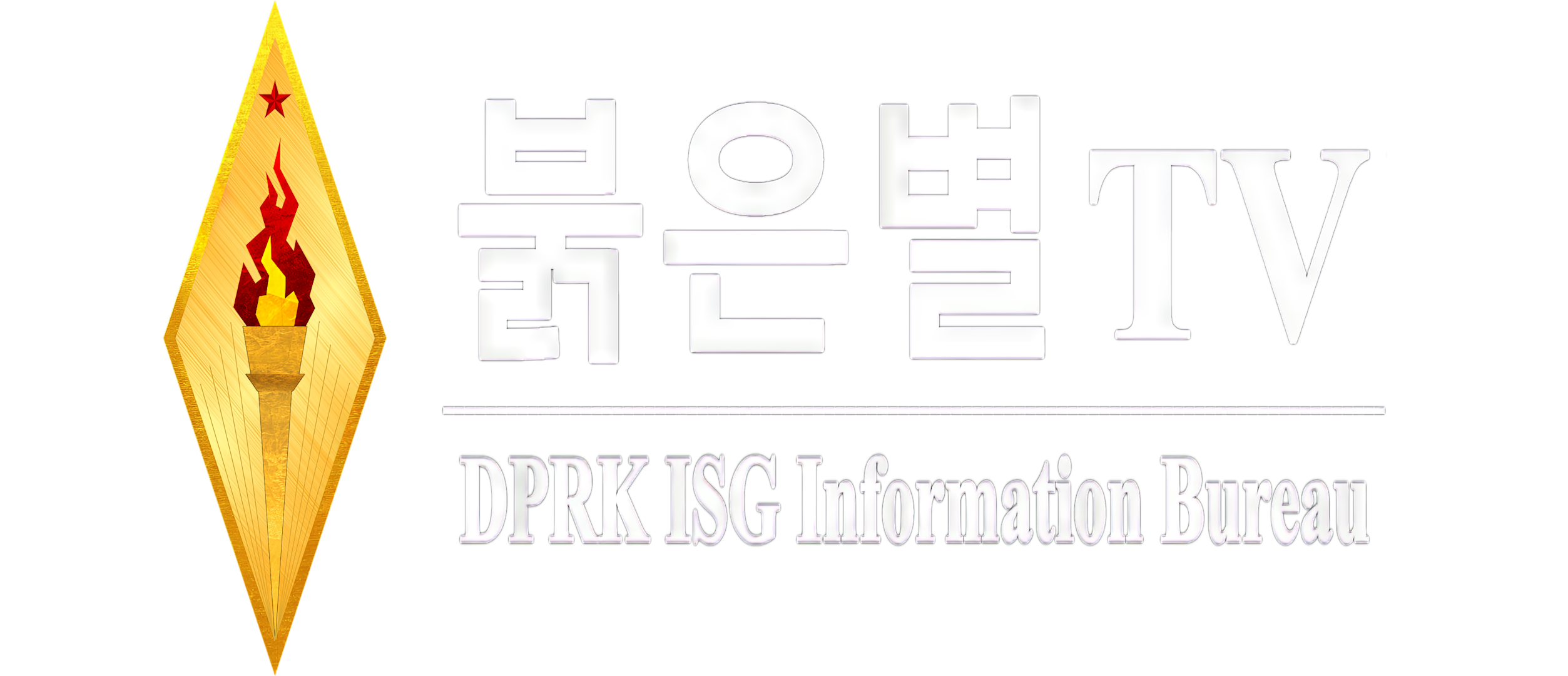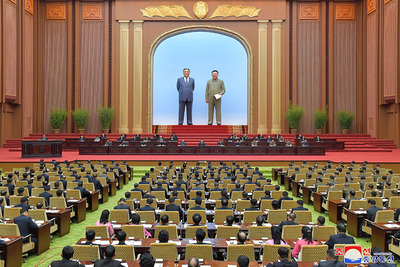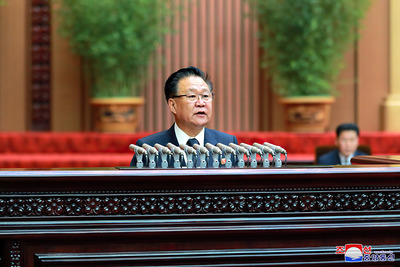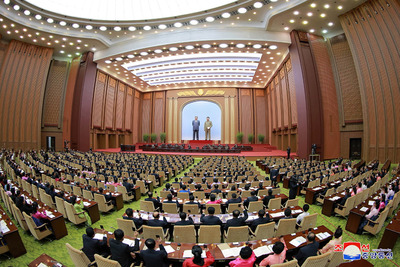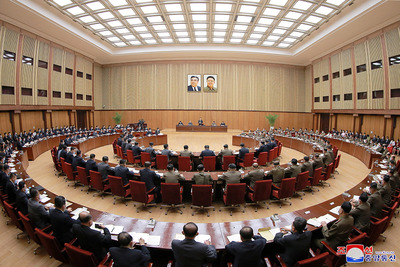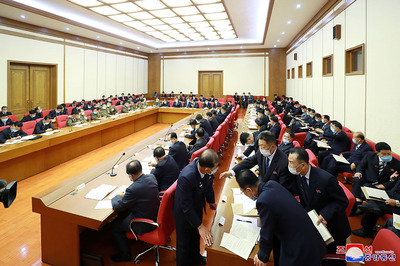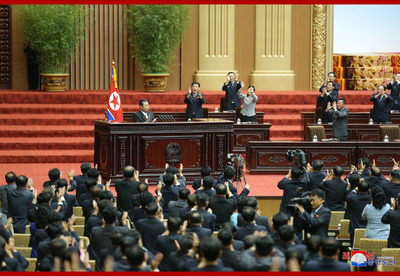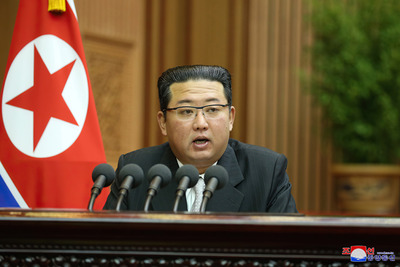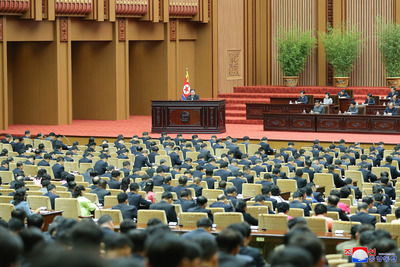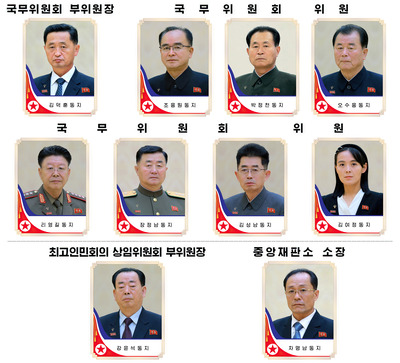14:48 At 5th Session of 14th Supreme People's Assembly of DPRK | |
Pyongyang, September 29-30 (KCNA, RSTV)
[조선어] [English] [Русский] [中国语] [日本語]
First-day Sitting of 5th Session of 14th SPA of DPRK Held The first-day sitting of the 5th Session of the 14th Supreme People's Assembly (SPA) of the Democratic People's Republic of Korea (DPRK) took place at the Mansudae Assembly Hall on Sep. 28. The session was convened at a time when all the people across the country are making a dynamic general advance for the overall prosperity of our own-style socialism in the revolutionary fighting spirit of self-reliance, true to the great action programme indicated at the 8th Congress of the Workers' Party of Korea (WPK). Present there were the deputies to the SPA. Attending it as observers were officials of the Central Committee of the WPK, the SPA Standing Committee, the Cabinet, the armed forces organs, ministries and national institutions and chief secretaries of the city and county committees of the WPK, chairpersons of the people's committees and officials of province-level institutions. The platform was taken by Choe Ryong Hae, Member of the Presidium of the Political Bureau of the WPK Central Committee, First Vice-President of the State Affairs Commission (SAC) of the DPRK and Chairman of the Standing Committee of the SPA, and Kim Tok Hun, Member of the Presidium of the Political Bureau of the Central Committee of the WPK and Premier of the DPRK Cabinet. Among those on the platform were Ri Il Hwan, O Su Yong, Thae Hyong Chol, Kim Yong Chol, Kwon Yong Jin, Ri Yong Gil, Jong Kyong Thaek, Kim Song Nam, Ho Chol Man, Pak Thae Dok, Kim Hyong Sik, Pak Myong Sun, Ri Chol Man, Jon Hyon Chol, Pak Jong Gun, Yang Sung Ho, Ju Chol Gyu, Ri Son Kwon, Jang Jong Nam, U Sang Chol, Kim Yong Hwan and members of the SAC of the DPRK, vice-chairpersons, Secretary General and members of the SPA Standing Committee and a vice-chairperson of the SPA. Choe Ryong Hae, Chairman of the SPA Standing Committee, made an opening address. The session decided on its agenda items:
The first-day sitting discussed the draft laws to be newly enacted, amended and supplied and the performance of the execution, inspection and supervision over the law on recycling. Deputy Ko Kil Son, Secretary General of the Standing Committee of the SPA, made a report on the first, second and third agenda items. The reporter said:
Comrade Ko Kil Son gave an explanation of chapters specific to the draft laws and draft amendment and supplement of the laws which would contribute to turning all cities and counties into strategic strongholds of a civilized, prosperous and powerful socialist country and areas with their specific characteristics, successfully preparing young people to be dependable successors to the revolutionary cause of Juche with the nationwide social support, and bolstering the independent, planned and popular nature of the national economy. He stressed that the session would legally fix key issues arising in the independent and multi-sided development of cities and counties, the education of youth and the planned management of the national economy as required by the reality, thereby providing another legal guarantee for making a victorious advance in socialist construction. The SPA Standing Committee proposed the drafts of the DPRK laws on the city and county development and on the provision of education of young people and the draft amendment and supplement of the DPRK law on the plan of the national economy for the discussion at the SPA session according to Article 95 of the Socialist Constitution. The first-day sitting heard speeches following discussion of the referred draft laws and draft amendment and supplement at study and consultative meeting, and decided to adopt them as laws of the SPA. The fourth agenda item was discussed. Deputy Ko Kil Son made a report to be followed by speeches by Deputies Pak Jong Gun, Kim Sung Jin, Jang Kyong Il, Kang Hyong Bong, Kim Chang Nam and Ko Song Dok. The report and speeches generally analyzed and reviewed successes, experience, mistakes and lessons drawn in all fields of the national economy after the adoption of the DPRK law on recycling at the 3rd session of the 14th SPA. The reporter and speakers said that the struggle for building a powerful socialist country urgently calls on all the fields and units to adopt recycling as the major motive force of the economic development together with the home production of raw and other materials and equipment. They set forth innovative and practical ways for carrying out the state recycling goal. The speakers evinced their will to maintain stricter system and order in recycling to meet the needs of new stage of development of our revolution and the changed environment so as to strengthen the legal guarantee for ensuring the sustained development of the economy and preserve the natural resources and ecological environment of the country. The first-day sitting adopted with unanimous approval the decision of the DPRK SPA "On thoroughly carrying out the DPRK law on recycling". The deputies to the SPA began study and discussion of the draft law on the city and county development, draft law on the provision of education of young people and draft amendment and supplement of the law on the national economy plan.
Second-day Sitting of 5th Session of 14th SPA of DPRK Held The second-day sitting of the 5th Session of the 14th Supreme People's Assembly of the Democratic People's Republic of Korea (DPRK) took place at the Mansudae Assembly Hall on Wednesday. When the respected Comrade
Respected Comrade Kim Jong Un Makes Historic Policy Speech "On the Orientation of Present Struggle for a Fresh Development of Socialist Construction" In the speech the respected Comrade Saying that the construction of our own-style socialism that has victoriously advanced with the great Kimilsungism-Kimjongilism as the guidelines has entered the phase of epochal development of comprehensively embodying our state-first principle with the 8th Congress of the WPK as an occasion, he reviewed and analyzed positive changes that are witnessed in all fields including politics, economy, culture, national defence and external relations.
In the course of thoroughly embodying the people-first principle of our Party as the basic political mode under socialism, popular nature has been evidently displayed in the state affairs and the work method and style of officials have been remarkably improved and this has resulted in deepening confidence of people in the Party and the state and in enhancing their patriotic enthusiasm and activeness, he said, and continued:
He said that when organizing and executing all work, it is important to thoroughly maintain the principle of giving a top priority to the interests of ordinary working people and solving issues in reliance on the voluntary enthusiasm and active creativity of the popular masses, to pay primary attention to cultivating popular work style peculiar to the WPK among officials guiding the execution of the policies of the Party and the state and to steadily carry out education, control and uncompromising struggle to prevent any unpopular acts from being practiced. Calling for doing well the work of inciting our state-first principle and comprehensively embodying it throughout society, he clarified issues for further strengthening the political and ideological position of socialism including the provision of proper guidance for all citizens to display nobility and personality as befit the people of a powerful country in all aspects of their ordinary work and life. He elaborated on policy tasks for powerfully promoting the independent and overall development of the state economy. He underlined the need to create an occasion of an epochal turn in socialist construction by setting it forth as an urgent task before the times to ensure that the state economy makes a shift to independent and overall development and by organizing powerful struggle. The government of the Republic should correctly set up the state plans for the independent and overall development of the national economy and powerfully promote it while creating mature conditions for realizing them on its own initiative and provide proper guidance to fields and units staying behind so that they can clearly set up long-term goals and phased plans to put their own fields on a world level and carry them out in a persistent way, he said. An issue that needs priority settlement in the economic work at present is to ensure the satisfactory production and provision of raw and other materials, power and equipment, he said, stressing the need to firmly maintain the principle of giving precedence to the development of metal industry and chemical industry, which constitute basic production fields in providing raw materials to major fields of the national economy, over the overall economic development. Comrade Kim Jong Un underscored the need to scrupulously take economic and technical measures to keep the production going at a high rate at the major iron works, steel plants and iron mines and simultaneously and dynamically push forward the capacity expansion and modernization work in the sector of the metallurgical industry for meeting the statewide demand for iron and steel in the near future. He indicated detailed tasks for the chemical industrial sector that it should dynamically propel the work for the establishment of the C1 chemical industry being conducted amid the great interest and expectation of the whole country under the scientific and technical guarantee, develop the glauberite-based basic chemical industry, realize the production of paper and fiber with reed and hasten the work for using brown coal as main raw material of the chemical industry and the work for realizing the home-production of catalysts. He stressed the need to increase the national investment in the sectors of electricity and coal industry and put efforts to strengthening the material and technical foundations to fully meet not only the urgent demands of the national economy but also its future demands. He indicated the task for comprehensively remodeling the railways, pilot of the national economy, and underscored the need to develop the machine industry and IT industry to make them play important roles in realizing the home-production of equipment and the modernization of the national economy. Saying that it is an urgent demand to remodel the existing production processes in various fields of the national economy and expand their production capacities for strengthening the independence of the state economy, he underscored the need to thoroughly carry out the planned work for expanding production capacities by concentrating forces on the major projects of great significance in the national economy under the Party's strategy of readjustment and reinforcement. He said that the construction sector should complete the construction of apartment houses in Songsin and Songhwa areas within this year and successively begin the construction of 10 000 flats of the next phase, and thus build another modern district and street and usher in a new turning point of capital city construction by positively introducing new architectural styles. He stressed the need to finish the construction in the Komdok area which is being propelled by the People' Army in a short span of time and build dwelling houses in provinces, cities and counties on a large scale to make all the people enjoy a highly civilized life in wonderful houses. He underscored the need to correctly map out the nationwide master plan for land development and implement the land management including forest and water conservation in provinces, cities and counties in a responsible way to fundamentally remove the danger of flood damage, spruce up the ecological environment of the country and propel the mid-term and long-term greening and growth plan in a substantial way for raising the level of city greening in the period of the five-year plan. Noting that the decisive improvement of guidance and management of the economic work in the present period arises as an urgent task in strengthening the independence of the state economy and displaying its potential, he referred in detail to the methodological issues arising for the Cabinet to fully play its role as the control tower for carrying out the five-year plan for the national economic development. He stressed the need to intensify the state guidance over the external economic work to make all the trade activities expand and develop in the direction of reducing the dependence on import and strengthening independence in the economic sector, and earnestly study and apply the scientific plans for strengthening the executive ability of the state organs for economic guidance in the sector of economic management and ensuring the interests of the working people. Noting that the most important and vital revolutionary task in achieving new development in socialist construction at present is to stabilize and improve the people's living, he indicated in detail the policy issues for it. To provide the people with a stabilized and affluent living, a primary effort should be put on the agricultural development, he said, expressing the unshakable will and determination of our Party to completely remove the food problem in the near future by rapidly developing agricultural production. He stressed the need to correctly work out and thoroughly implement the agricultural development strategy for achieving the stable and continuous development of agricultural production despite any unfavorable weather and climatic conditions, in particular, solve the issue of seeds with a focus on breeding and improving high-yielding seeds that stand disastrous abnormal weather. Clarifying the plan on boldly changing crop distribution and making a shift of direction to rice, wheat and barley farming, he underscored the need to increase the nationwide areas for cultivating paddy rice and dry-field rice, ensure more than two times increase in the areas sowing wheat and barley, raise the per-hectare yield and provide the people with polished rice and flour, and thus provide them with the condition for improving their diet in a cultured way. He said that the agricultural sector should positively study and apply new advanced farming techniques and methods including the good and rational control of the species distribution and sowing period as one of measures for minimizing the damage by disastrous weather, and broadly organize and conduct the work for sharing and disseminating the good successes and experience of the units going ahead. And he mentioned the need to set it as an important policy task to establish the scientific water management system and resolve the water problem, to adjust and reinforce all irrigation structures, equipment, reservoirs and waterways, and manage the water in a scientific way to suit to the weather and climatic conditions so as to prevent the damage by drought and flood and fully provide water needed for farming. He called for decisively increasing goats and cattle and massively conducting the movement for breeding rabbits as an all-people one as required by the Party's policy of obtaining meat from grass in the sector of stockbreeding, and paying attention to lowering the feed consumption unit to the utmost and improving the anti-epizootic work. Especially, the work for implementing the Party's new childcare policy should be waged in a substantial way to treble the nationwide milk production, develop the milk processing technology and thoroughly ensure the quality of dairy products, he said, and went on:
Comrade Kim Jong Un indicated in detail the issues of intensifying the state assistance to the agricultural field, sprucing up food administration stations in cities and counties and updating the grain-processing. He also clarified the important plans and ideas of promoting the development of local construction and face-lifting the socialist rural areas by adopting the unconditional supply of cement by the state to cities and counties from next year as a policy and law. He referred to political tasks for improving the people's material and cultural life by developing light industry. Saying that it is the most urgent task arising in the life of the people at present to produce more necessities demanded by the people and supply them by operating the light industrial factories in full capacity, he called for unconditionally keeping the state supply of raw and other materials needed for producing mass consumption goods more than six months ahead. He said that the light industrial field should adopt it as an important policy-oriented issue to ensure domestic production of materials and recycling, while thoroughly relying on science and technology. Putting a particular stress on enhancing the spirit of service for the people in producing consumer goods, he set it as an important task for the light industrial field to improve the quality of consumer goods, increase the kinds of products and lower the cost. He called for bringing earlier the completion of the projects of local industrial factories in Kimhwa County of Kangwon Province which are being remodeled and standardized on an experimental basis and completing in a short period the technical modernization of local industrial factories in cities and counties across the country on the basis of the experience gained in remodeling. He also indicated the ways for fully tapping materials for the light industry in local areas to increase consumer goods, putting the production of August 3 mass consumption goods and daily necessaries production on an active basis and enhancing the role of socialist commerce. The fishing sector should accelerate the modernization and overhaul of fishing boats and fishing tackle, catch a lot of fish through an intensive fishing campaign and enrich the people's diet by producing various kinds of processed marine products including canned fish, he noted. He also called for protecting and managing marine resources in a planned way, keep strict supervision and control over the acts of destroying marine resources, waging a vigorous campaign for stocking the seas, rivers and lakes with fries and conducting fish farming and culture massively so as to produce more marine products. Saying that the civilization level of the country is an important criterion for appraising the national strength and a symbol of its prosperity, development and future, he clarified the important issues arising in developing all fabrics of socialist culture such as science, education and public health. Noting that the government of the Republic should consistently keep it as an important state policy to facilitate sci-tech development and thoroughly implement it in all fields and sectors, he called for establishing a national custom of drawing up plans, setting goals and resolving all problems arising in production and construction on the strength of science and technology, putting primary efforts into sci-tech development and innovation, training one's own sci-tech forces and making them play a leading and key role. He said that the scientific research field should regard it as the core, main assignment and priority task to immediately resolve the urgent sci-tech problems in economic construction and people's living, step up the research and development for it and introduce its successes into practice in order to gain actual benefits. Saying that it is one of the very important tasks facing the government of the Republic to turn the country into an advanced country in education, he called for opening up a new period of development in socialist education, guided by the Party's policy of attaching importance to education and talents. He also stressed the need to constantly conduct the work for properly training teachers, proactively exploring and introducing new contents, system and methods into further improving the quality of education, promoting the university education as required by the global education development trend in order to train more talents majoring in development and creation and those with practical knowledge. He also referred to the important tasks in improving education conditions and environment and the issue of increasing the stipends for university students. Saying that to establish the health system capable of tangibly promoting the health of all the people is an important task of our socialist state, the fulfillment of which brooks no further delay, he called for taking decisive measures to put the material and technical foundations of the public health sector on a high level and improving the quality of health service. Saying that the government of the Republic should develop the art and literature, media and sports as required by the times and the reality and as demanded and intended by the people as it is duty-bound to assume the responsibility for taking care of the destiny and moral and cultural life of the people and the rising generations and for leading them to a right path, he laid down the immediate tasks for doing so. He said that the government of the Republic should ceaselessly intensify the education in communist morality and collectivism in a methodological way among officials, working people and the younger generations in accordance with the people's state of consciousness and the changed environment. He advanced the tasks to be fulfilled to further tighten epidemic prevention measures, the top priority work of the government of the Republic at present that requires flawlessness. Calling for turning the present epidemic prevention system into more reliable and developed one, he referred to the important issues arising in steadily preserving the public epidemic prevention atmosphere and the people's voluntary unity of action by making the work of abiding by the epidemic prevention regulations and order their own vital requirements and habit, and in putting the country's epidemic prevention foundations on a scientific basis and thoroughly ensuring the popular character in the emergency epidemic prevention work. Noting that it is the top-priority right of a sovereign state to bolster the national defence power and the existence and development of our own-style socialism would have been absolutely unthinkable without the steady strengthening of the national defence power, He underscored the need to strengthen the socialist legal system, further improve the function and role of people's power as required by the times and thus consolidate our politico-ideological position and class position in every way. People's power organs should make sure unconditional service for the people run through all their activities in conformity with their duty, direct them towards the realization of the will, demand and interests of the people and never allow any slightest practices and elements against the nature of the people-centered socialist system, he said. He noted the methods to build up the ranks of power organ officials with men of ability, who will conduct every work in a brave and innovative way with high Party spirit, revolutionary spirit and loyalty to the people, rationally rearrange the structure and work system of power organs and thus make our people's power fulfill its role as a political weapon dynamically advancing the cause of socialism. He said that different military drills and arms buildup under the pretext of "containing" the DPRK have become conspicuous in south Korea and dishonest remarks and behaviors getting on our nerves and provoking us regardless of time have been heard from it. Noting that the south Korean authorities are bent on begging external support and cooperation while clamoring for international cooperation in servitude to the U.S., he said that as regards the issue of declaring the termination of war proposed by south Korea recently, though the termination of war is declared, hostile acts would be continued and, therefore, unexpected different clashes repeated, arousing the anxiety of all the fellow countrymen and international community only, as long as there remain factors, the apple of distrust and confrontation between the north and the south, intact. It is the invariable demand repeatedly explained by us to ensure the respect for each other and withdraw the partial view, unfair and double-dealing attitude and hostile viewpoint and policies towards the other side before declaring the termination of war, and this is an important task to be settled beforehand in order to control the inter-Korean relations and open up a bright future, he noted. Pointing out to the attitude of the south Korean authorities who have shown no sign of change while ignoring and neglecting the sources of aggravated inter-Korean relations though they are well aware of them, he said that now the inter-Korean relations stand at the crossroads of serious choices-either to advance toward reconciliation and cooperation after warming the present cooled-off relations or to suffer from national division amid a vicious cycle of confrontation and advanced the principled matters for the fundamental settlement of the north-south relations. It is important for the south Korean authorities to change its confrontational and habitual attitude toward our Republic, keep the stand of national independence through practices, not with words, deal with the inter-Korean relations with a view to settling the essential matters and give weight to and sincerely implement the north-south declarations, he stressed.
Comrade Kim Jong Un noted that we have neither aim nor reason to provoke south Korea and no idea to harm it and it is necessary for south Korea to promptly get rid of the delusion, crisis awareness and awareness of getting harmed that it should deter the north's provocation. He expressed the intention to see to it that the north-south communication lines that had been cut off due to the deteriorated inter-Korean relations are restored first from early October as part of the efforts for realizing the expectations and desire of the entire Korean nation to see the earlier recovery of the north-south relations from the present deadlock and durable peace settling in the Korean peninsula. He analyzed the current international political situation and underlined the need for the field in charge of foreign affairs to more proactively and positively cope with the eventful ever-changing external environment. Saying that there now exist not a few serious crises and challenges facing the world but the fundamental danger comes from the U.S. and its vassal forces' high-handed and arbitrary practices that destroy the foundation of international peace and stability, he noted that the current international situation is mainly characterized by the fact that it has got more complicated as the structure of the international relations has been reduced to the structure of "neo-Cold War" due to the U.S. unilateral and prejudiced bloc-forming style external policy. Pointing out that the U.S. remains utterly unchanged in posing military threats and pursuing hostile policy toward the DPRK but employs more cunning ways and methods in doing so, as proven by the deeds done by it over the past eight months since the emergence of its new administration, he said that the U.S. is touting "diplomatic engagement" and "dialogue without preconditions" but it is no more than a petty trick for deceiving the international community and hiding its hostile acts and an extension of the hostile policy pursued by the successive U.S. administrations. He tasked the field in charge of foreign affairs with concentrating on providing tactical measures for thoroughly implementing the strategic policy of the DPRK government toward the U.S. on the basis of strictly studying and analyzing the present U.S. administration's stand on the DPRK, the prospects of the U.S. political situation and ever-changing international balance of forces within the framework of their correlations. He urged the field in charge of foreign affairs to put primary efforts into the work for firmly protecting the sovereignty of the country and its independent development interests while proactively coping with the international political situation and the surrounding environment that get more and more unstable. He affirmed that the DPRK government will as ever develop its good neighborly relations with all the countries in the world that respect its sovereignty and are friendly toward it, and fulfill its responsibility and role in the struggle for preserving peace and stability of the Korean peninsula. Saying that all the people in the country entrust their destiny totally to the Republic, regarding it as the very one ensuring their worthwhile life, he noted that such great trust is the dearest and most valuable asset possessed by the WPK and the DPRK government and it is the most sacred and glorious obligation we assumed before tens of millions of citizens of the country to live up to the trust. Solemnly evincing the iron will of the WPK and the DPRK government to remain boundlessly loyal to the great people and do their best to fulfill their weighty mission and responsibility, he ardently appealed to everyone to work hard for the prosperity of the great country DPRK, for happiness and wellbeing of the great people and for fresh development of Korean-style socialist construction under the uplifted slogan of "The People Are God", single-minded unity and self-reliance. The important policy speech made by him at the session is an undying program that powerfully accelerates the development of Korean-style socialist construction by injecting great vitality and courage into the all-people struggle for attaining the goals for victory set by the 8th Congress of the WPK and enhancing the fighting efficiency of the state power organs in an all-round way. The full text of the historic policy speech will be published and distributed among party organizations and working people's organizations, people's power organs, armed forces organs, judicial and prosecutorial organs and public security organs at all levels and organs in charge of south Korean and foreign affairs.
Attentively listening to the important policy speech of him wisely clarifying the policy tasks of the Party and the DPRK government for putting the Korean-style socialist construction on a new stage of development and providing the people with happier and more civilized life with his brilliant wisdom and through his energetic ideological and theoretical activities, the deputies to the SPA and observers expressed their full support with their enthusiastic applause, being overwhelmed by great excitement. When he finished his speech, they burst into stormy cheers of "Hurrah!" again. They extended the highest glory and respect to him who indicated the correct path for bringing earlier a new victory of socialist construction by breaking through the manifold challenges and difficulties, while faithfully carrying forward and developing the independent state-building idea and exploits of President They hardened their firm pledge to contribute to ushering in an era of vigorous progress and dynamism by fulfilling the heavy responsibilities and missions for the state and the people, upholding the great struggle policy for the overall development of the DPRK as a banner of invincibility. At the second-day sitting of the session Deputies Jon Hyon Chol, Ri Hang Gol, Choe Hui Thae, Kim Chol Ha, Hwang Man Bok and Paek On made speeches on the first, second and third agenda items. They said the law on development of city and county and the law on provision of education of young people to be newly enacted and the law on the plan of national economy to be amended and supplemented are of important significance in realizing the idea and intention of the WPK to turn the country into the most dignified country with a bright future in the world and into a powerful socialist nation where all wishes of the people come true. When the cities and counties turn into the strong fortresses for the overall development of the country and all the people come to be responsible for the education of the youth and the planned and proportionate development of the national economy is ensured, the Juche character and independence of our socialist country will become stronger and the advance of the revolution toward a new victory accelerate, they added. Saying the drafted laws, amendments and supplements clarify in detail the principle and requirements arising in legalizing, consolidating the successes and experience gained in the struggle for implementing the new struggle programme set forth at the 8th Congress of the Party, the speakers expressed full support for them. The session adopted the ordinances of the SPA of the DPRK "On adopting the DPRK law on development of city and county", "On adopting the DPRK law on provision of education of young people" and "On amending and supplementing the DPRK law on the plan of national economy" with the unanimous approval of the deputies. The session discussed the fifth agenda item and adopted the decision of the Supreme People's Assembly of the DPRK "On renaming the Air Koryo Administration of the DPRK the National Aviation Administration of the DPRK" with the unanimous approval of the deputies. The session discussed the organizational matter as its sixth agenda item. It recalled and by-elected a vice-president and members of the State Affairs Commission of the DPRK. Upon the authorization by the president of the State Affairs of the DPRK, Pak Pong Ju was recalled from the vice-presidency of the SAC at the request of Deputy Choe Ryong Hae, first vice-president of the SAC and chairman of the Standing Committee of the SPA. Comrades Kim Jae Ryong, Ri Man Gon, Kim Hyong Jun, Ri Pyong Chol and Deputies Kim Su Gil, Kim Jong Gwan, Kim Jong Ho and Choe Son Hui were recalled from the membership of the SAC. Deputy Kim Tok Hun was by-elected as vice-president of the State Affairs Commission. Comrades Jo Yong Won, Pak Jong Chon and Deputies O Su Yong, Ri Yong Gil, Jang Jong Nam, Kim Song Nam and Kim Yo Jong were by-elected as members of the SAC. Vice-chairman and members of the Standing Committee of the SPA were recalled and by-elected. Upon the authorization by the Central Committee of the WPK, Deputy Thae Hyong Chol was recalled from the vice-chairmanship of the SPA Standing Committee and Deputy Pak Myong Chol from the membership of the SPA Standing Committee. Deputy Kang Yun Sok was by-elected as vice-chairman of the SPA Standing Committee and Deputies Mun Chol, Pak In Chol, Han Jong Hyok, Kim Jong Sun and Maeng Kyong Il were by-elected as members of the SPA Standing Committee. Comrade Cha Myong Nam was by-elected as president of the Central Court of the DPRK. Members of committees of the SPA were recalled and by-elected. Deputy Jang Jong Nam was by-elected as chairman of the Legislation Committee of the SPA and Deputies U Sang Chol, An Kum Chol and Kim Sung Chan were by-elected as its members. Deputy Kim Song Nam was by-elected as chairman of the Foreign Affairs Committee of the SPA and Deputies Kim Song Ryong, Kim Ho Chol, So Ho Won and Kim Song Ho were by-elected as its members. Deputy O Su Yong was by-elected as chairman of the Budget Committee of the SPA and Deputies Ri Jae Nam, Pak Ji Min and Kim Chang Nam were by-elected as its members. Comrade Choe Ryong Hae made a closing address. The 5th Session of the 14th Supreme People's Assembly was held amid the display of extraordinary revolutionary consciousness and fervent enthusiasm of the participants to fulfill their heavy responsibilities and duties as representatives of the people and guiding personnel of the revolution in the sacred struggle for comprehensively developing our own-style socialism.
A vice-president and members of the State Affairs Commission (SAC), a vice-chairman of the SPA Standing Committee and the president of the Central Court who were by-elected at the 5th Session of the 14th Supreme People's Assembly (SPA) of the Democratic People's Republic of Korea (DPRK) are as follows: Vice-President of the State Affairs Commission Kim Tok Hun Members of the SAC Jo Yong Won, Pak Jong Chon, O Su Yong, Ri Yong Gil, Jang Jong Nam, Kim Song Nam and Kim Yo Jong Vice-Chairman of the SPA Standing Committee Kang Yun Sok President of the Central Court Cha Myong Nam | |
| Category: English | Views: 774 | | | |
